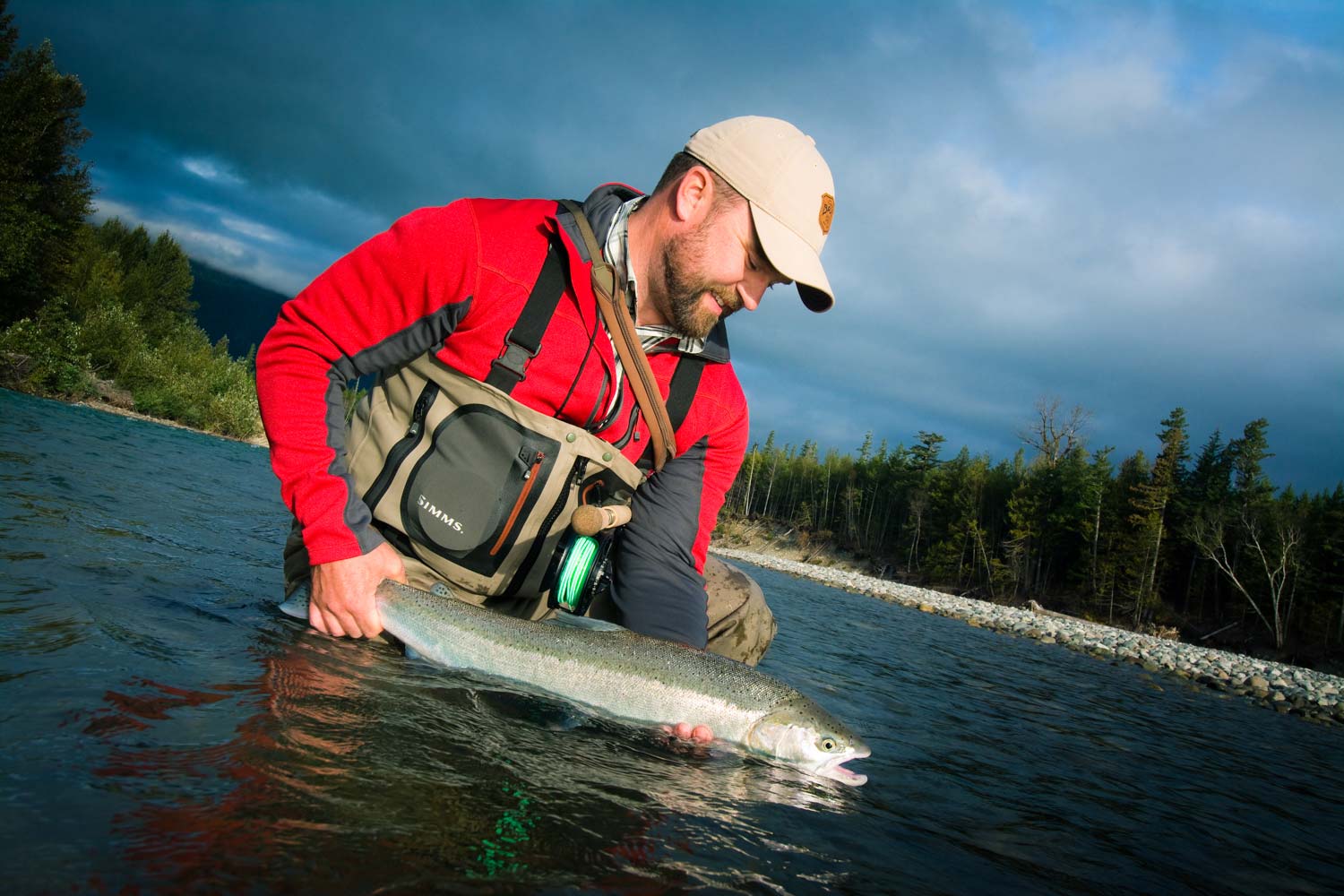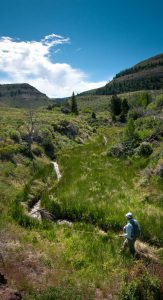
Photo by Louis Cahill
By Louis Cahill
What would I have to pay you to give up fly-fishing?
If you are not familiar with the term consumer surplus, don’t feel bad. It is, to my mind anyway, a pretty esoteric concept, but one which economists hold a lot of stock in. It’s a way of measuring the parts of our economy that can’t be measured. It’s the value of what you don’t pay for.
On one level it makes a lot of sense. An area that economists spend a lot of time evaluating is the digital economy. For example, a study was done to evaluate the consumer surplus of Facebook. If it could be determined what people would pay for Facebook, that figure would be the consumer surplus. That’s a hard value to asses, so they did the next best thing. They figured out what it would cost to get people not to use Facebook. They actually paid people to give it up for a month. The average cost of getting someone off of Facebook was $48 per month.
Personally, I have a lot of feelings about that. I quit Facebook about a year and a half ago. The account is still there and Justin Pickett posts on it for me but it’s been a year and a half since I looked at it. I would pay well over $48 per month to not see Facebook and I might be willing to pay others not to use it. If you are a Facebook user, I recommend giving it up. You’ll be happier, I promise. Ok, enough rant.
This got me thinking about the consumer surplus in fly fishing. What is the value of the things that we don’t pay for? Let’s start with Gink and Gasoline. Don’t worry, I’m not going to start charging you, but you’d be shocked how many times that idea has been pushed on me. You might be surprised to hear that I have turned down three offers to sell G&G, so I have some idea of what that figure might be, but what is it worth to you, the reader?
It’s worth a great deal to me. Not in dollars, but in my heart. That part of me is a little put off by some economist’s assertion that the digital efforts of my labor are simply part of some math equation bent on figuring my worth to the machine. Still, there is a dollar and cents value to what’s going on here and it isn’t cheap to run anymore. I’d like to point out that the bill is currently being paid by the awesome folks whose ads you see on the site. Also the folks who come on the hosted trips and the straight up heroes who contribute the content. That’s worth thinking about next time you hit the comment section.
So if we can put a value on the five minutes you waste every day, at work I assume, reading G&G, what about the time you actually spend fishing? Let’s use the same math as the Facebook study.
What would I have to pay you to give up fly-fishing?
I hope you felt a disturbing chill when you read that, because I certainly felt one when I wrote it. What would that actually look like? Personally, I find it very hard to imagine. Let’s look at it another way. Have you ever been forced to give up fly fishing for a period of time? Why? Was it a job? An illness? Either your own or maybe a loved one. A marriage, or maybe the birth of a child? What were you paid for that job? Better yet, what, in dollars, is that marriage, child or loved one worth to you? If you and I have anything in common, that reads as a pretty F’ed up question but that’s the math were talking about.
So go along with me for a minute. Come up with that figure.
 What would it cost me for you to never cast a fly rod again? It’s a big number, right? Mine sure is. Let’s call that number X. Now, think about the last time you went fishing and complained about how many people were on the river. Count them. Multiply that number by, I don’t know, 365 days in a year. Add yourself to that number and and let’s call that number Y. Now multiply X times Y. Is that the value of a trout stream, bass lake or bonefish flat? Not yet.
What would it cost me for you to never cast a fly rod again? It’s a big number, right? Mine sure is. Let’s call that number X. Now, think about the last time you went fishing and complained about how many people were on the river. Count them. Multiply that number by, I don’t know, 365 days in a year. Add yourself to that number and and let’s call that number Y. Now multiply X times Y. Is that the value of a trout stream, bass lake or bonefish flat? Not yet.
Let’s add to that the income of the guys down at the fly shop. How about the folks that made that rod, those waders, the line, the flies, the boots? What about that 4×4 you bought so you could get to the better water and the gas you put in it? Got a boat? A Yeti? Add all that stuff in. Oh yeah, add that number you came up with for G&G, and every other site you look at. And the cost of running the fish and game department and national and state parks.
I could go on like this for a while, but let’s seriously look at that number. I’m guessing there are a lot of zeros at this point. This may sound silly but it’s exactly the kind of math economists use to figure things like consumer surplus, which to some people is almost as important as the GDP.
Come up with your own number. Write it down. I dare you. What’s your favorite trout stream, lake or flat worth? Dollars and cents. What’s your number?
Whatever it is, it’s low. Not even close. Because a trout stream is not a durable good. It’s not replaceable. You can’t sell it and make another. Remember how it felt when I asked you to put a dollar value on your child? That’s what we’re talking about. That kind of irreplaceable. It’s a unique living thing that can never be duplicated.
So be careful. You likely thought it was a joke when I asked what it would cost for you to give up fly fishing but you might already be making that bargain. You might be selling that favorite stream and not even know it. What is it worth to you to keep it? Another thousand dollars a year in taxes? Another dollar a gallon? Choices matter. That is, if fly fishing matters to you.
Louis Cahill Gink & Gasoline www.ginkandgasoline.com hookups@ginkandgasoline.com Sign Up For Our Weekly Newsletter!
Fly fishing is a way to stick a hook in a fishes mouth. For years – decades – I didn’t do it.
I never even considered it.
I still don’t see it as a “lifestyle,” or a do or die thing.
There are elements of in, in fact, that I find outright distasteful.
Could I be paid to stop doing it? In a minute.
Would it be cheap? No.
But it’s allure is one built up, one we convince ourselves of.
I could talk myself out of it …. for a price.
The world doesn’t need any more negative and critical people. There’s already an abundance of that. Why not keep it positive?
I don’t see this as negative at all. This individual obviously feels they way they state, and it’s important context for their ultimate answer. I don’t think sharing your opinions is negative just because others may not agree.
Interesting idea – I had never previously considered that.
Not sure what the price to make me stop fishing would be, but it would be high.
No doubt, the remainder of my life would be much less enjoyable.
I would miss out on all those beautiful fishing sights and sounds and then I’d have to pay a psychologist and then…
Glad I really don’t have to do all that.
Thanks for the article. Nice work.
Great article. The message I hear is that we should put our money where our mouths (or rods) are. I get disgusted every time I wade or float past sunken trash like beer cans and plastic bags. This idea takes it a step further. Not only should we protect our waters but we should all be investing in them. Treating them like our own property and the precious assets they are. I bet without fly fishing crime rates and especially violent crimes would increase. Just imagine a world without fly fishing. Makes me think of the movie WWZ. That I would not like to see. Thanks again for the article.
What a great question. I’d give up a day of fly fishing to help a friend move, to ride my mountain bike, work on a Saturday, or to do almost anything. But give it all up, forever? I’m not sure there’s enough money on earth. That’s how important fly fishing is to me, and it’s why I’m a T.U. member.
Give up the only thing in life I enjoy? No price. Not $1,000,000,000,000. What would I spend my money on if not fishing? What would occupy my time if I could retire, but not fish?
I haven’t been able to fish since April or May of 2012. First, demands of a new job (70+ hours per week along with daily commutes of an hour or more each way) for a few years with the hope of a better position with more pay and fewer hours. Second, several years of dealing with health issues (permanently messed up back, surgeries on both knees and my left hip) at least partly attributable to the stress and wear and tear that job caused. Third, I’m now in graduate school working toward a new career.
All that time, I might not have been able to go fishing, but I stayed somewhat connected through blogs like this, attending fly fishing shows, and watching YouTube videos. Now, I should finally be able to go fishing again at some point in the next few months, and it frankly scares me a bit. I worry that being unable to do the things on the stream I used to be capable of doing, and that fishing will become something that represents what I can no longer do.
Yet, I imagine the sheer volume of experience that entails the sport makes that unlikely. I might not be able to fish as aggressively as I once did, but I hope I can still get out and land a few fish while enjoying the environment in which I get to experience it. Fly fishing is so much a game in which we as anglers set arbitrary conditions for how we measure a successful day that I am sure with a few expectation changes I will still enjoy the sport.
Tim do not be too concerned about doing what you used to be able to, just take it easier make necessary adjustments. I used to hike miles & climb down canyons to get to good waters but after a hip replacement & advancing years can no longer do so I have a good jeep a drift boat & simply drive row or both to good waters still finding new places to fish within my limits & still thoroughly enjoying it. I also go on more guided trips where the guides do all the hard work & are willing to help you.
Living in Idaho its easy to take fishing for granted, 3 years ago I had it taken away from me due to an injury. I will never take it for granted again. Money ? I have no idea. Its not a hobby or sport to me, its time to heal and get a proper perspective of things.
The final paragraph is a killer. Yes, it is far too easy to make unconscious decisions and never realize the consequences until it is too late. I know of too many people who donate money for fish, then turn around and take actions that render their donations meaningless, usually because they do not take the time to educate themselves and reason out their choices (I do not claim that this an easy or quick thing to do, but… it is yet another choice).
Hey Louis,
thank you for your writing this morning. How much would I have to be paid to give up FF. ?I’m not even going there. Fly fishing and fly tying, after my faith and my family, are my passions. I get to use my hands, my mind, my whole body, even my soul, when I’m fishing or tying.
I’ve been working for several days in a row, but I’m off this afternoon, and I am headed out to chase the white bass spawn. Whether I catch and release 1 or 31, I know it’s going to be a great day outside in God’s creation. I’ll come home tonight tired, but it’ll be the best kind of tired I know.
I hope you don’t ever give up your blog. There’re so many times when I can’t go fishing , but reading about it, thinking about it, and anticipating it, through your blog, is the next best thing. And often, it’s not just the fishing that speaks to me, but our shared humanity that permeates many of the experiences and the writing which describe them. Thanks again to you and Justin and the other contributors. Happy Easter! Danny
Actually did have to give up fly fishing (and mostly everything else) for a whole year after a knee replacement went bad. Even spent 4 months in a wheelchair, unable to walk. I really missed being on the water. I sort of figured the cost of the year – about $100,000 in medical bills, $120,000 in lost income, and that’s just my personal costs. Trying to figure out the lost income for the fly fishing community in lost revenue to them would be really hard, but let’s take a $500 a month as a starting point. So $100,000 + $120,000 + $6,000 is somewhere around $226,000.
So, would I actually take that to give up fly fishing for a year? Not a snowballs chance. Expecting to live and be able to fish for another 30 years puts that number in the $6 million range. So, would I take that? No. What would I do with that money to replace the feelings that fly fishing brings?
Your last question is the one that made me really think about the economics of fly fishing. What would I willing pay more than I presently spend each year? What would I actually give up? I’d willingly but not happily pay more to get my out of state license for those cool trips, maybe pay a little more for the floats with the cool guides or maybe give up a float or two if the costs were just too much.
And as much as I enjoy reading about the latest and greatest gear, I think I can limp along with my current gear, and just replace what wears out, like waders and boots. That certainly impacts the fly fishing equipment vendors, but lets face it, who really needs another $1,000 5wt rod?
Interesting questions, as for facebook I have never been on it or any other social media for that matter, never had the urge rather spend the time tying flies, planning the next trip or reading up on new gear & tactics e.g. on this site. As for giving up fly fishing it would literally cost an arm & a leg to get me to give it up even then I would still probably find a way there is no dollar amount the only thing would be physical limitations as I approach old age but believe me I will fight those off for as long as possible.
How much does it cost to make a movie? For years I’ve preached making a movie called “A Golf Course Runs Through It”. Then people would leave the streams and go play golf. If that works we could perhaps have a sequel of “A Bike Trail Runs Through It” and get a few more to leave. With enough imagination we might be able to make many sequels and get rid of all those people who watched “A River Runs Through It” and crowded our streams.
And you never know. If we are creative enought we might actually make some money on the films and the cost of getting those people to to quit fly fishing would be negative.
Just saying.
And in the end I suppose we will all have to be content watching “A Pebble Mine Runs Through It.” More people fishing benefits us all.